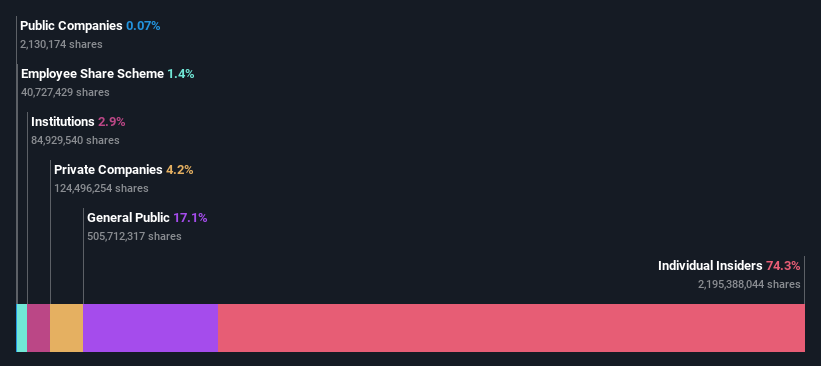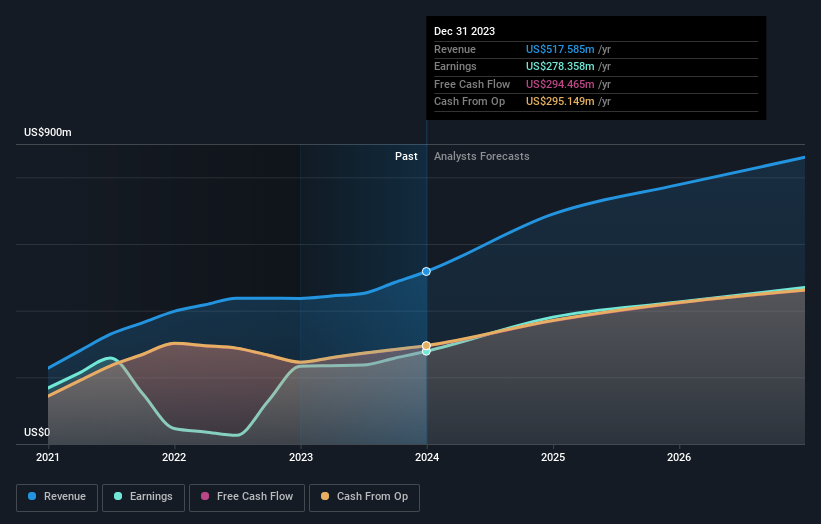With 74% ownership, GQG Partners Inc. (ASX:GQG) insiders have a lot at stake
Key Insights
Insiders appear to have a vested interest in GQG Partners' growth, as seen by their sizeable ownership
Rajiv Jain owns 70% of the company
Analyst forecasts along with ownership data serve to give a strong idea about prospects for a business
To get a sense of who is truly in control of GQG Partners Inc. (ASX:GQG), it is important to understand the ownership structure of the business. And the group that holds the biggest piece of the pie are individual insiders with 74% ownership. In other words, the group stands to gain the most (or lose the most) from their investment into the company.
So it follows, every decision made by insiders of GQG Partners regarding the company's future would be crucial to them.
Let's take a closer look to see what the different types of shareholders can tell us about GQG Partners.
Check out our latest analysis for GQG Partners
What Does The Institutional Ownership Tell Us About GQG Partners?
Institutional investors commonly compare their own returns to the returns of a commonly followed index. So they generally do consider buying larger companies that are included in the relevant benchmark index.
Since institutions own only a small portion of GQG Partners, many may not have spent much time considering the stock. But it's clear that some have; and they liked it enough to buy in. So if the company itself can improve over time, we may well see more institutional buyers in the future. It is not uncommon to see a big share price rise if multiple institutional investors are trying to buy into a stock at the same time. So check out the historic earnings trajectory, below, but keep in mind it's the future that counts most.
We note that hedge funds don't have a meaningful investment in GQG Partners. Because actions speak louder than words, we consider it a good sign when insiders own a significant stake in a company. In GQG Partners' case, its Chief Investment Officer, Rajiv Jain, is the largest shareholder, holding 70% of shares outstanding. Meanwhile, the second and third largest shareholders, hold 4.2% and 4.0%, of the shares outstanding, respectively. Interestingly, the second-largest shareholder, Timothy Carver is also Chief Executive Officer, again, pointing towards strong insider ownership amongst the company's top shareholders.
While studying institutional ownership for a company can add value to your research, it is also a good practice to research analyst recommendations to get a deeper understand of a stock's expected performance. Quite a few analysts cover the stock, so you could look into forecast growth quite easily.
Insider Ownership Of GQG Partners
While the precise definition of an insider can be subjective, almost everyone considers board members to be insiders. The company management answer to the board and the latter should represent the interests of shareholders. Notably, sometimes top-level managers are on the board themselves.
I generally consider insider ownership to be a good thing. However, on some occasions it makes it more difficult for other shareholders to hold the board accountable for decisions.
Our information suggests that insiders own more than half of GQG Partners Inc.. This gives them effective control of the company. Given it has a market cap of AU$7.2b, that means insiders have a whopping AU$5.4b worth of shares in their own names. Most would argue this is a positive, showing strong alignment with shareholders. You can click here to see if they have been selling down their stake.
General Public Ownership
With a 17% ownership, the general public, mostly comprising of individual investors, have some degree of sway over GQG Partners. While this group can't necessarily call the shots, it can certainly have a real influence on how the company is run.
Private Company Ownership
It seems that Private Companies own 4.2%, of the GQG Partners stock. Private companies may be related parties. Sometimes insiders have an interest in a public company through a holding in a private company, rather than in their own capacity as an individual. While it's hard to draw any broad stroke conclusions, it is worth noting as an area for further research.
Next Steps:
While it is well worth considering the different groups that own a company, there are other factors that are even more important. Consider for instance, the ever-present spectre of investment risk. We've identified 1 warning sign with GQG Partners , and understanding them should be part of your investment process.
Ultimately the future is most important. You can access this free report on analyst forecasts for the company.
NB: Figures in this article are calculated using data from the last twelve months, which refer to the 12-month period ending on the last date of the month the financial statement is dated. This may not be consistent with full year annual report figures.
Have feedback on this article? Concerned about the content? Get in touch with us directly. Alternatively, email editorial-team (at) simplywallst.com.
This article by Simply Wall St is general in nature. We provide commentary based on historical data and analyst forecasts only using an unbiased methodology and our articles are not intended to be financial advice. It does not constitute a recommendation to buy or sell any stock, and does not take account of your objectives, or your financial situation. We aim to bring you long-term focused analysis driven by fundamental data. Note that our analysis may not factor in the latest price-sensitive company announcements or qualitative material. Simply Wall St has no position in any stocks mentioned.

 Yahoo Finance
Yahoo Finance 

